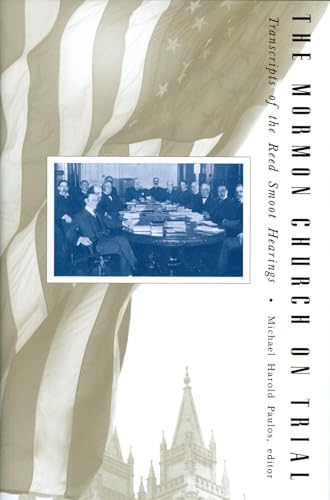The Mormon Church on Trial: Transcript of the Reed Smoot Hearings
Michael Harold Paulos
About the Book
Description:
Very Good Copy. Customer Service Guaranteed. Seller Inventory # think_very_156085152X
About this title:
Synopsis: Contrary to popular folklore, the LDS temple ceremony was not performed or recited in the U.S. Senate chambers during the 1904-06 challenge to Reed Smoot’s election from Utah. Nor was it entered into the Congressional Record. The committee investigating Apostle-Senator Smoot’s qualifications wanted to know if temple participants promised to avenge the blood of the martyred prophet Joseph Smith and whether that vengeance was sworn upon “this generation” or upon “this nation,” the former being considered a matter of religious dogma and the latter possible treason against the United States.
However, Senators did want to know about the LDS Church’s controversial practice of polygamy, especially since 1890 when the practice was formally abandoned. Surprisingly, Church President Joseph F. Smith admitted that he had fathered eleven children by five wives since 1890. Asked about his role in receiving revelations for the church, Smith replied that he had received none thus far. Other questions probed the church’s involvement in politics, including action taken by the church against Apostle Moses Thatcher for saying that “Satan was the author of the Republican Party.”
To a large extent, the Mormon Church, not Senator Smoot, was the real target of the Senate’s scrutiny. Some felt uncomfortable about this emphasis. Senator Bailey (D-Tx) “objected to going into the religious opinions of these people. I do not think Congress has anything to do with that unless their religion connects itself in some way with their civil or political affairs.” But Smoot’s critics proceeded to show a convoluted tangle of Utah business, political, and religious affairs and what they considered to be un-American religious supremacy in all areas. They argued that a Senator “legislates for 80 million people who hold as their most cherished possession ... a respect for law because it is law, as Reed Smoot, unhappily for him, has never felt nor understood from the moment of his first conscious thought down to the present hour. ”
From the Inside Flap: from the jacket flap:
The fabled Reed Smoot hearings (1904-06) ushered the LDS Church into twentieth-century American life. Originally published alongside other government business in four volumes comprising 3,432 pages, the current abridged and annotated volume makes for accessible, comprehensible, and suspenseful courtroom drama. Many of the witnesses called to testify—for and against Smoot—emerge as unforgettable characters. Almost all possessed information not generally known to the public, which makes their statements all the more revealing. In voicing personal beliefs, they often exhibit equal doses of eloquence and belligerence. They occasionally seem to disclose more than they had intended. Some stand firmly on principle, while others are clearly there to advance personal agendas.
Greatly enhancing the impact of these transcripts, editor Michael Paulos cites behind-the-scenes communications between Reed Smoot and Joseph F. Smith, among others. In a typical letter, Smoot complains that the public overheard President Smith and Elder Francis M. Lyman having a “jolly good laugh” on the train home after testifying, bragging about how they had “put [Senator] Burrows in a hole.” Smith replied that their “jolly laugh” was over how that “sly old fox, Senator Haor,” had “tangled [with Lyman] on the Senator’s favorite theme—’revelation.’ We thought the shrewd old lawyer rather got Lyman into the hole.”
After Smoot himself testified, his secretary, Carl Badger, wrote home to his wife that the Senator had “wanted his religion to appear reasonable and common-sensed to his fellow associates on the Committee.” Badger added that “the Senator is a very practical man, he is not spiritually minded. He is not well educated, has done comparatively little reading; his ideas are not exact, and his way of expressing them is vague and uncertain so that his testimony in some ways was unsatisfactory, but taken as a whole, and considering what I had expected from him I was well pleased with what he said. ... The Senator is not a brave man in a moral sense, but we all shrink when it comes to the test. You must not allow anyone else to read my letters. Be very careful about quoting me. The Senator is an anomaly as an apostle, and the situation can only be explained by a recourse to the thought that the ways of the Lord are inscrutable to man. ... I am thoroughly convinced that this investigation answers some divine purpose—that we need it and therefore it has come. ... The Senator has been under a very severe strain, and deserves our sympathy.”
Bibliographic Details
Title: The Mormon Church on Trial: Transcript of ...
Publisher: Signature Books
Publication Date: 2008
Binding: Hardcover
Condition: very good
